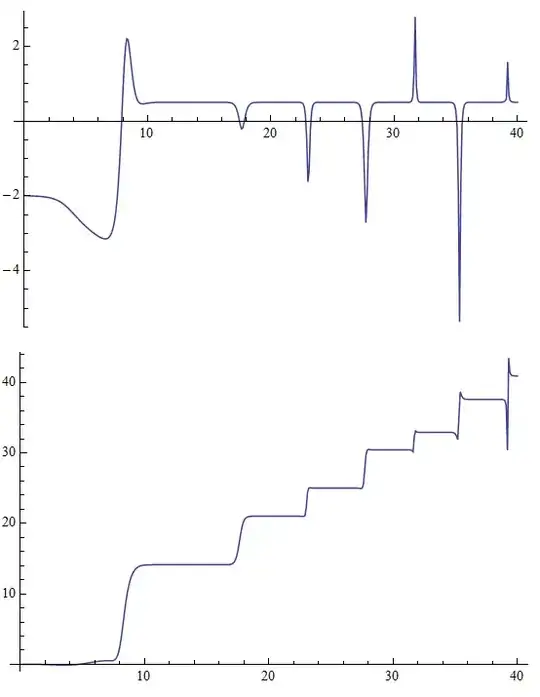I found this approximation of which an earlier version I posted in the chat room:
$$7 \pi -\text{Log}\left[\frac{7}{2} e^{-7 \pi /2}+\frac{5}{2} e^{-5 \pi /2}+\frac{3}{2} e^{-3 \pi /2}+e^{5 \pi /2}+2 \pi \right] = 14.13472514154629716253329494571302508888...$$
The first non trivial zeta zero: $$14.13472514173469379045725198356247027078$$
Can you improve on the formula above?
Edit 2.9.2012
Based on the comments below I would like to explain how I reasoned:
Any Taylor series evaluated at $x=1$ is convergent for variants of it when multiplied element wise with rows in this matrix:
$$\begin{bmatrix} 0&0&0&0&0&0&0 \\ 1&-1&1&-1&1&-1&1 \\ 1&1&-2&1&1&-2&1 \\ 1&1&1&-3&1&1&1 \\ 1&1&1&1&-4&1&1 \\ 1&1&1&1&1&-5&1 \\ 1&1&1&1&1&1&-6 \end{bmatrix}$$
Many Taylor series have the second row as part of its coefficients. That is: $$(1,-1,1,-1,1,-1,1,-1,1,-1,...)$$
Such Taylor series are for example $\log 2$, $\sqrt 2$, $\cos 1$, $\sin 1$. The reason for the convergence of such series and divisibility defined variants of thereof, seems to be that in the matrix above, a period sums to zero.
The simplest Dirichlet series that sums to zero and is not a an element wise multiplication of two other Dirichlet series, is the first row:
$$\frac{0}{1}+\frac{0}{2}+\frac{0}{3}+\frac{0}{4}+\frac{0}{5}+... = 0\ \ \ \ \ \ \ \ \ \ \ \ \ \ \ (1)$$
This suggests that one should try to find an expression for a such sequence.
The definition of a number raised to a complex number is:
$$n^{(a+ib)} = n^{a}(\cos (b \log (n))+i\sin (b \log (n)))$$
and the Riemann zeta function is:
$$\frac{1}{1^s}+\frac{1}{2^s}+\frac{1}{3^s}+\frac{1}{4^s}+\frac{1}{5^s}+...$$
where $s$ is a complex number.
Here I then made a mistake. I started studying the equation: $$\cos (\log (n)) = 0\ \ \ \ \ \ \ \ \ \ \ \ \ \ \ (2)$$ in order to get something similar to the Dirichlet series with numerators equal to the all zeros sequence in expression $(1)$ above. But if I understand correctly this would be the same as seeking the undefined sequence:
$$\frac{1}{0}+\frac{1}{0}+\frac{1}{0}+\frac{1}{0}+\frac{1}{0}+\frac{1}{0}+\frac{1}{0}+$$
After that I just guessed that by combining values from the solutions to equation $(2)$ one could possibly find an expression for the zeta zeros.
Edit 23.12.2012: For what it is worth. Here is how the actual calculation went:
The first Riemann zeta zero is:
$$\Im(\rho _1)$$ $$=14.1347251417346937904572519836$$
A number close to the first Riemann zeta zero is:
$$\frac{9 \pi }{2}$$ $$=14.1371669411540695730818952248$$
That number can be split up into:
$$\frac{9 \pi }{2} = 7 \pi -\log \left(e^{\frac{5 \pi }{2}}\right)$$
To see what is missing within the logarithm I added an $x$ and solved the equation:
$$\text{Solve}\left[N\left[7 \pi -\log \left(x+e^{\frac{5 \pi }{2}}\right),30\right]=N[\Im(\rho _1),30],x\right]$$
This gives the solution:
$$\{\{x\to 6.297688980465813720589098\}\}$$
which is close to:
$$2\pi = 6.28318530717958647692528676656...$$
Substituting $x$ with $2\pi$:
$$7 \pi -\log \left(e^{\frac{5 \pi }{2}}+2 \pi \right)$$
which is closer:
$$=14.1347307583914370155699744066$$
Some small number seems to be missing, the second harmonic number could be it:
$$7 \pi -\log \left(e^{-\frac{1}{2} (3 \pi )}+e^{\frac{5 \pi }{2}}+2 \pi \right)$$
which again is closer:
$$=14.1347272795405950845865949010$$
Multiplying the added number with $\frac{3}{2}$
$$7 \pi -\log \left(\frac{3}{2} e^{-\frac{1}{2} (3 \pi )}+e^{\frac{5 \pi }{2}}+2 \pi \right)$$
closer still:
$$=14.1347255401197125097619679160$$
continuing the trick with similar numbers:
$$7 \pi -\log \left(\frac{5}{2} e^{-\frac{1}{2} (5 \pi )}+\frac{3}{2} e^{-\frac{1}{2} (3 \pi )}+e^{\frac{5 \pi }{2}}+2 \pi \right)$$
works:
$$=14.1347251642841507747886817861$$
and once more:
$$7 \pi -\log \left(\frac{7}{2} e^{-\frac{1}{2} (7 \pi )}+\frac{5}{2} e^{-\frac{1}{2} (5 \pi )}+\frac{3}{2} e^{-\frac{1}{2} (3 \pi )}+e^{\frac{5 \pi }{2}}+2 \pi \right)$$
it works:
$$=14.1347251415462971625332949457$$
but then I can't get further.
Edit: 5.11.2013:
$$\frac{\sqrt{\frac{\Im(\rho _1)}{\pi }+\frac{1}{2}}}{\sqrt{5}}=0.999922272089659461895288929782$$
$$\frac{\Im(\rho _1)}{\pi }+\frac{1}{2}=4.99922275110473484848654142318$$
$\rho _1$ = first riemann zeta zero = 14.134725141734693790457...
